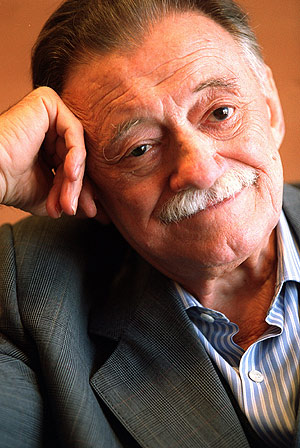Mario Benedetti (Mario Benedetti)

Mario Benedetti was born in Paso de los Toros in the department of Tacuarembó to Brenno Benedetti (pharmaceutical and chemical winemaker) and Matilde Farrugia, a family of Italian descent. Mario completed six years of primary school at the Deutsche Schule in Montevideo, where he also learned German, which allowed him later to be the first translator of Kafka in Uruguay. When Nazism was present in the classrooms, he was immediately removed from the school by his father. For two years he studied at Liceo Miranda, but for the rest of his high school years he did not attend an educational institution. In those years he learned shorthand, which was his livelihood for a long time. At age 14 he began working, first as a stenographer and then as a seller, public officer, accountant, journalist, broadcaster and translator. He trained as a journalist with Carlos Quijano, in the weekly March. Between 1938 and 1941 he lived in Buenos Aires, Argentina. In 1946 he married Luz López Alegre. He was a member of the ‘Generation of 45’, a Uruguayan intellectual and literary movement: Carlos Maggi, Manuel Flores Mora, Ángel Rama, Emir Rodríguez Monegal, Idea Vilariño, Carlos Real de Azúa, José Pedro Díaz, Amanda Berenguer, Ida Vitale, Líber Falco, Juan Carlos Onetti, among others. He also wrote in the famous weekly Uruguayan newspaper Marcha from 1945 until it was forcibly closed by the military government in 1973, and was its literary director from 1954. For 12 years, from 1973 to 1985, when a civic-military dictatorship ruled Uruguay, Benedetti lived in exile, first going to Buenos Aires. Mario Benedetti then went to Lima in Peru where he was detained, deported and then given an amnesty. He went to Cuba in 1976 and the following year went to Madrid, Spain. His exile was made particularly trying as his wife had to remain in Uruguay to look after both of their mothers. In 1980 he moved to Palma, Majorca.
Mario Benedetti returned to Uruguay in March 1983 following the restoration of democracy, dividing his time between Montevideo and Madrid. He was granted Honoris Causa doctorates by the Universidad de la República, Uruguay, the Universidad de Alicante, Spain and the Universidad de Valladolid, Spain. In 1986 he was awarded Laureate Of The International Botev Prize. On 7 June 2005, he was named the recipient of the Menéndez Pelayo International Prize. His poetry was also used in the 1992 Argentine movie The Dark Side of the Heart (El lado oscuro del corazón) in which he read some of his poems in German. In 2006, Mario Benedetti signed a petition in support of the independence of Puerto Rico from the United States of America. In the last ten years of his life he suffered from asthma and spent his winters in Madrid (where it was summer) in order to avoid the cold, though as his health deteriorated he eventually remained in Montevideo. In 2006 his wife Luz López died, ending more than six decades of matrimony. He died in Montevideo on 17 May 2009, a little after 6:00 pm. He had suffered from respiratory and intestinal problems for more than a year. His remains are buried at the National Pantheon, Central Cemetery of Montevideo.
Born
- September, 14, 1920
- Paso de los Toros, Uruguay
Died
- May, 17, 2009
- Montevideo, Uruguay
Cemetery
- Cementerio del Buceo
- Montevideo, Uruguay



